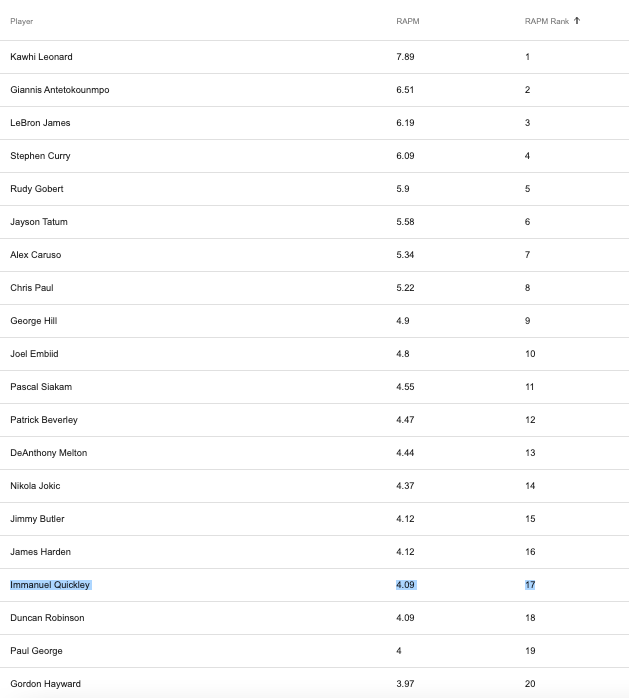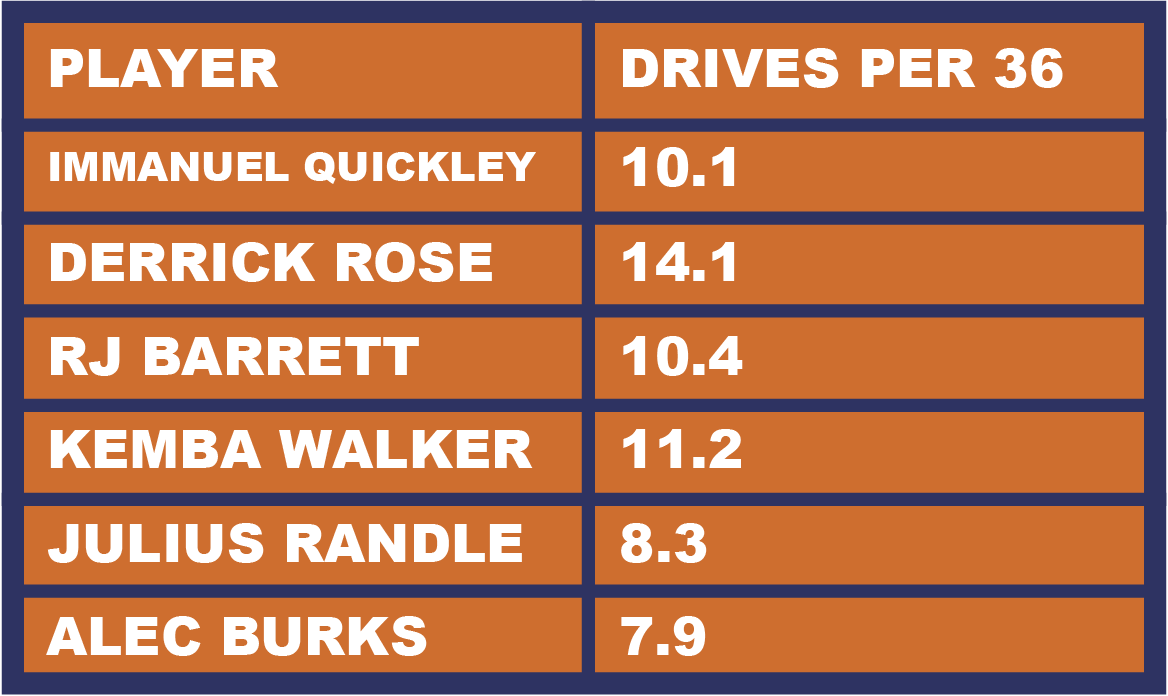Are we asking the wrong Immanuel Quickley question?
One question has followed Immanuel Quickley discourse around during his two years with the Knicks: Is he a point guard? But the real question might be, does it even matter?
Question: why are we devoting far too much time to a fairly useless Immanuel Quickley question, while an extremely useful Immanuel Quickley answer is patiently staring us in the face?
Answer: because Twitter is a perfectly-weighted wooden club that the neanderthal parts of our brain are powerless to resist.
The end. Come back next week for the quantification of new-Knick Cam Reddish’s essence of bucket into a single meaningless number.
Seriously though, however juicy and unanswerable a topic it is to discuss and dissect, Quickley’s position — its impurity! its imperfections! its immediate limitations! — is less important than his impact in whatever you prefer to call the role he is in. The positional labels — off guard, combo guard, scoring guard, point guard — are semantic fluff distracting from the boots-on-the-ground truth that Immanuel Quickley is very good at his job.
So good at his job, in fact, that he's Tom Thibadeau's best shot at an answer to the increasingly concerning meta-question hovering ominously over this Knicks season — what, exactly, is the best way to get Julius Randle going?
The answer is unequivocally Quickley.
Last season, the two-man pairing of IQ and Randle had a net rating of +11.5 in 631 minutes together, the highest mark of any combination involving the Knicks’ best player. This wasn't some small sample, either. Randle’s second-best running mate was Derrick Rose at +8.9 in 592 minutes.
This season, again, IQ has proven to be the most consistently positive influence on Randle on the roster. In 372 minutes the duo have a net rating of +2.2, which is one of only two positive two-man net ratings Randle is a part of, the other being Obi Toppin and Julius' tantalizing +6.3 in 90 mythical minutes together.
There are many potential reasons as to why Randle benefits from Quickley’s presence — the raw shooting, the urgency, the defensive communication, the sneakily relentless penetration — but the bottom line is that we now have over 1000 minutes worth of evidence that IQ is the best available Robin to Randle’s Batman.
Better than point guard Derrick Rose. Better than favorite not-a-point-guard Alec Burks. Better than whatever version of point guard Kemba Walker happens to show up on any particular night.
From the moment he forced his way into the rotation as a rookie, it’s not been difficult to find evidence of Quickley’s impact.
Per NBA Shot Charts, IQ is 17th in three-year (2019-22) RAPM (Regularized Adjusted Plus Minus), an all-in-one metric that should be interpreted not as a ranking, but rather a measure of a player’s effectiveness in the role in which they were used. The well-decorated company Quickley is keeping in this top-20 list shouldn’t tempt any comparisons of ability, or talent, or skill, but should be used as evidence that — as the youngest player on the list, as he improves with every game, in a league where young players rarely impact winning — he has been as impactful as his role has allowed so far in his NBA career.
Per Cleaning The Glass, of players to play a minimum of 500 minutes this season, IQ is sixth in the NBA in net rating. Again, this should be taken with all the appropriate caveats, that on/off numbers are a two-person dance, indicative not only of Quickley’s consistency but of his opposite number’s inconsistency. Nonetheless, his steady play as almost every other player on the roster waxes and wanes depending on the opponent, the direction of the wind, or what was on the dinner menu the previous night matters.
Per NBA Stats, IQ is one of 32 players to take more than 100 pull-up threes so far this season, and at 35% is 13th in percentage. This has always been the shot to define Quickley’s offensive endgame. It’s also probably fueled the Question Of Positional Doom some — he’s such a natural shooter that it’s nudged his detractors towards the Lou-Will-clone label, whereas if he couldn’t shoot they’d probably happily call him a bad point guard and leave it at that. As a rookie last season he shot 33% on pull-up triples, so his efficiency has gone up, even if the degree of difficulty and duress has remained at a dangerously “no-no-YES!” level for Thibs’ ticker.
Maybe the most underrated part of IQ’s development this season is his improved ability and wilingess to get in the paint. His drives per game more than hold up against the more obvious volume drivers on the roster when converted to a per-36 minute number. We’ve all seen how important a penetrating point guard is to a Thibodeau offense, and while he doesn’t break down matchups off the dribble in the same way as Rose can, he’s got to the point where he can weaponize the threat of his shot to conjure up and capitalize on advantages. This is the fruit of an improved, and improving, handle.
This is not that complicated. The Knicks are at their best with Quickley on the floor. Julius Randle is at his best with Quickley on the floor. So maybe we should stop burrowing down reductive positional rabbit holes in search of the answer to The Quickley Question — and start empowering the sophomore as part of an answer to some of the Knicks’ more urgent dilemmas.
It also helps that he’s one of the most electric Knicks this century, constantly a flick of the wrist away from ignition, with an infectiously genuine and totally unselfconscious joy constantly on display: skipping and swimming and screaming through games. The way he plays is at times irresistible, a sort of human radiator emitting a steady stream of basketball fun, which may go some way to explaining why the numbers paint him as someone it’s beneficial to play with; especially for some of the more — shall we say — energetically variable players on the roster.
Personally I’m opting for Immanuel Quickley: Good-At-His-Job Guard. But call him whatever you want.
As long as he gets the minutes his impact deserves, who cares?






